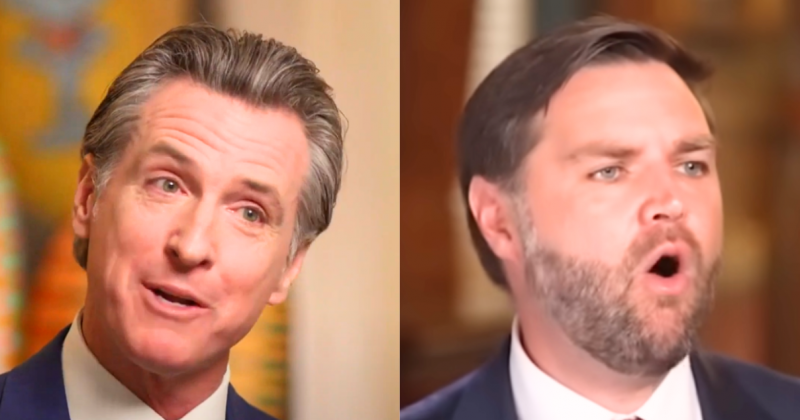Gov. Gavin Newsom (D-CA) is facing mounting criticism after posting artificial intelligence–generated videos mocking Vice President JD Vance, even though his own administration recently pushed through strict laws regulating the use of deepfakes in political content.
On Wednesday, Newsom’s official social media account on X published a video that altered Vance’s image.
The clip depicted him with a yellow face, oversized cartoon glasses and blue overalls, transforming the vice president into a character resembling a minion from the animated Despicable Me franchise.
The video also modified Vance’s voice, replacing it with a distorted, high-pitched tone.
A second AI-generated video was also released by Newsom’s office. In this clip, Vance appeared heavier and curly-haired, delivering remarks about couches.
The video referenced an old internet rumor claiming Vance once engaged in inappropriate behavior with a couch, a claim widely recognized as false.
“There are rumors that I once had an encounter with a Chesterfield,” Vance said in the fabricated video.
“People exaggerate, twist the truth, but when you sit on one, you understand where such stories come from.”
“The Chesterfield isn’t just furniture, it’s an experience, and some of us know that a little too well.”
The post included a caption that read, “POOR JD! HIS SWEET BELOVED COUCH NOW COSTS MORE WITH THE TARIFFS!”
The combination of the edited video and the caption drew swift responses online, with critics accusing Newsom of violating the very principles his administration has promoted.
The Post Millennial (TPM) highlighted that in 2024, California passed a series of laws restricting AI-generated media during political campaigns.
The legislation prohibited “materially deceptive” content—defined as altered images, videos, or audio that could mislead voters or harm a candidate’s electoral chances.
The rules extended to satirical or humorous content if it did not carry a clear disclaimer.
Newsom supported these measures at the time, which were intended in part to protect then–Vice President Kamala Harris from online memes and ads that critics argued could unfairly damage her public image.
The regulations quickly faced legal challenges in federal court, per TPM.
Among the most vocal opponents was the satirical outlet the Babylon Bee, which argued that the laws amounted to censorship.
The outlet claimed that California’s restrictions on parody and AI content violated constitutional protections for free speech and political satire.
Criticism intensified after Newsom’s office shared the recent Vance videos, with many pointing out a contradiction between the governor’s actions and his earlier advocacy for strict oversight of AI.
Observers circulated an old social media post from Newsom, in which he argued that “manipulating a voice in an ‘ad’” should “be illegal.”
The governor’s social media presence has also increasingly mirrored that of President Donald Trump.
Newsom’s posts have adopted Trump’s style of using all-caps text, repeating phrases and posting messages that resemble the tone and cadence of Trump’s online activity.
The videos targeting Vance came shortly after Trump shared his own AI-generated content.
Last week, the president posted a video depicting House Minority Leader Hakeem Jeffries with a sombrero and a cartoon-style Mexican mustache.
That post was labeled by critics as “racist.”
Rather than back away, Trump responded by sharing another similar video.

